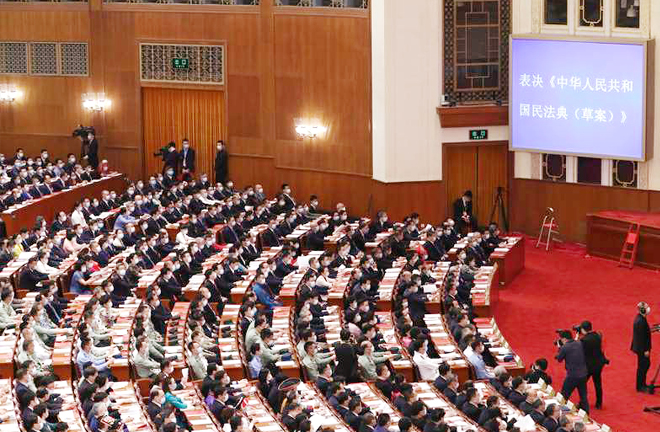China’s Civil Code adopted at national legislature

The closing meeting of the third session of the 13th National People’s Congress at the Great Hall of the People in Beijing, May 28, 2020 Photo: Ding Haitao/XINHUA
Chinese lawmakers on May 28 voted to adopt the country’s long-expected Civil Code at the third session of the 13th National People’s Congress, China’s top legislature.
The Civil Code will take effect on Jan. 1, 2021.
In addition to general provisions and supplementary provisions, the Civil Code, the world’s latest modern-day civil law, has six parts covering real rights, contracts, personality rights, marriage and family, succession, and tort liabilities.
The personal rights, property rights and other lawful rights and interests of parties to civil legal relations shall be protected by law and shall not be infringed upon by any organization or individual, reads the Civil Code in its opening chapter.
Lawmakers say the codification is not about formulating a new civil law but rather systematically incorporating existing civil laws and regulations, modifying and improving them to adapt to new situations while maintaining their consistency.
In fact, China already has a slew of stand-alone civil laws and regulations in place. But these laws, introduced at different times, sometimes overlap and occasionally even contradict each other.
Wang Cheng, a professor from the Peking University Law School, said that the promulgation and implementation of the Civil Code will unify China’s civil law, effectively reducing conflicts and inconsistencies among the rules and providing rules for the comprehensive protection of the rights of the parties to civil legal relations and their fulfillment of obligations.
Wen Shiyang, a professor from the Law School at Zhongnan University of Economics and Law, said that the Civil Code reflects humanistic concerns and highlights people-centered legislative thinking.
Xie Hongfei, a research fellow from the Institute of Law atthe Chinese Academy of Social Sciences, said that the compilation of the Civil Code could not have been made possible without strong national will, rapid market economic growth, superb legislative technology and profound academic accumulation.
The promulgation and implementation of the Civil Code will further promote the modernization of national governance and enhance the level of political advancement, Xie said. Determining the boundary between public and private rights and emphasizing the protection of legitimate civil rights and interests requires Party and government departments to respect and protect civil rights and control abuse of power.
The Civil Code is the basic law of the market, which stipulates the various types of market entities, confirms property rights in various market transactions, and promotes the development of the market economy in depth, Xie continued. In addition, the Civil Code also has important practical significance for highlighting the soft power of China’s legal culture, improving the level of justice in the civil field and facilitating a sound legal environment.
The promulgation of the Civil Code indicates that the theoretical research of China’s civil legal system has begun to shift from legislative theory to explanatory theory. Wang said that explanatory research into the Civil Code will be the main content and new direction of civil law research, and it should comply with the basic rules of legal interpretation. Scholars’ explanatory research into the Civil Code can provide academic support for the highest judicial organs to sort out existing judicial interpretations and formulate new ones, as well as provide justification for judges at all levels of courts in judging civil cases.
After the hard work of civil law scholars, the theoretical system of Chinese civil law has been established, Xie noted. The focus of future research should be on issues in the application of the Civil Code. There are many new systems and new rules in the Civil Code. A key direction for China’s civil law research will be to reach a consensus with the judiciary on the practical needs of research while conducting more in-depth theoretical research.
edited by JIANG HONG
